The number of children living in poverty has swelled over the past three decades in fast-growing, ethnically diverse states such as Texas, Arizona and Nevada as the nation's population center shifts south and west, a report Monday on childhood well-being shows.
The annual Kids Count report from the Annie E. Casey Foundation found that 18% of the nation's children live in poverty, down from the Great Recession.
But the same advances weren't seen in the Southwest, where many children are Native Americans, Latinos and immigrants who have long faced disadvantages.
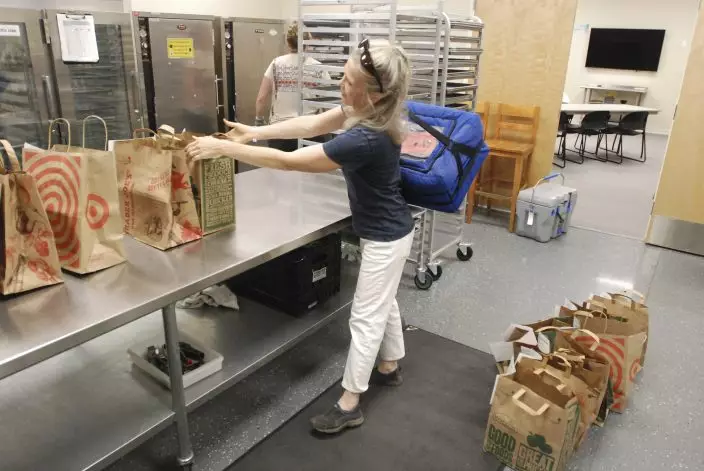
In this photo taken Friday, June 14, 2019, volunteers including 60-year-old Laura Orchard pick up food packages to deliver to homebound families and dependent children in Santa Fe, N.M., at the headquarters for Kitchen Angels. An annual report on childhood well-being from the Annie E. Casey Foundation ranks New Mexico last among 50 states that includes measures of poverty, health care, education and family support. The number of children living in poverty has swelled over the past three decades in fast-growing, ethnically diverse states such as Texas, Arizona and Nevada as the nation's population center shifts south and west. (AP PhotoMorgan Lee)
"The nation's racial inequities remain deep, systemic and stubbornly persistent," said the annual Kids Count report from the Annie E. Casey Foundation.
"Thirteen million children continue to live in poverty in spite of the economic growth that we have seen recently, and low unemployment," said Leslie Boissiere, a vice president at the foundation.
"In those border states, it's as many as one in five. So you're seeing a higher rate of poverty among children in those states."
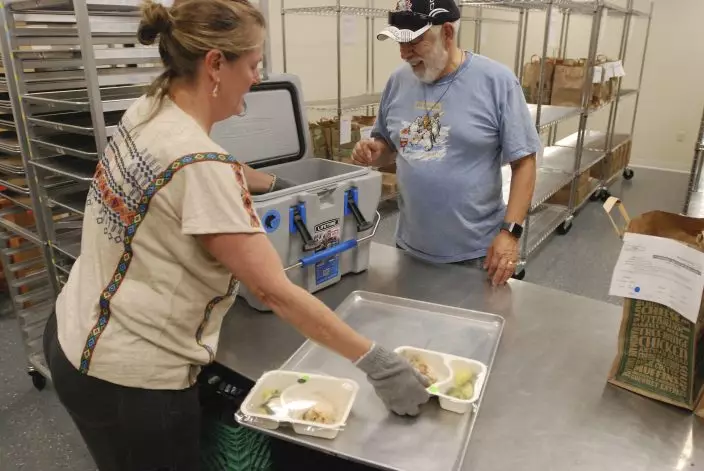
In this photo taken Friday, June 14, 2019, volunteers including retired accountant Ralph Nava, right, 69, pick up food packages to deliver to homebound families and dependent children in Santa Fe, N.M., at the headquarters for Kitchen Angels. An annual report on childhood well-being from the Annie E. Casey Foundation ranks New Mexico last among 50 states that includes measures of poverty, health care, education and family support. The number of children living in poverty has swelled over the past three decades in fast-growing, ethnically diverse states such as Texas, Arizona and Nevada as the nation's population center shifts south and west. (AP PhotoMorgan Lee)
The share of children without health insurance increased slightly in 2017, the most recent year studied, but remains near an all-time low at 5%. That was attributed in large part to state Medicaid programs and provisions of the Affordable Care Act.
Since 1990, however, the national rate of childhood poverty has remained unchanged.
The report measured 16 indicators of childhood well-being, from the rate of low birthweights and teen pregnancy to third-grade reading abilities and the prevalence of single-parent families.
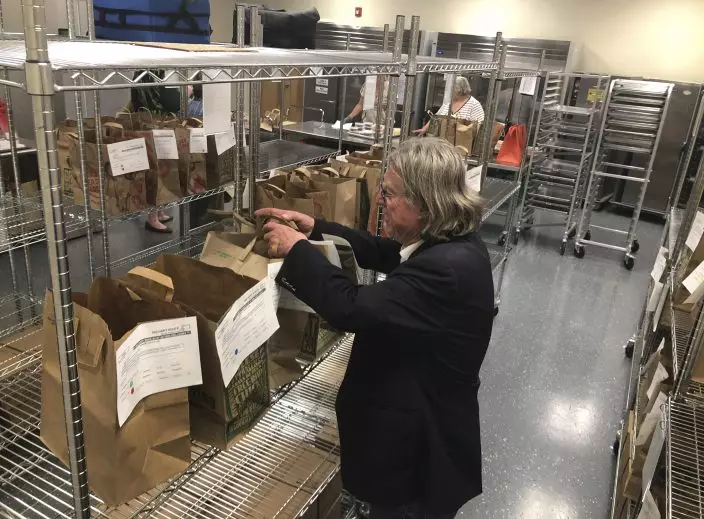
In this photo taken Friday, June 14, 2019, volunteers including 67-year-old consultant John Miller pick up food packages to deliver to homebound families and dependent children in Santa Fe, N.M., at the headquarters for Kitchen Angels. An annual report on childhood well-being from the Annie E. Casey Foundation ranks New Mexico last among 50 states that includes measures of poverty, health care, education and family support. The number of children living in poverty has swelled over the past three decades in fast-growing, ethnically diverse states such as Texas, Arizona and Nevada as the nation's population center shifts south and west. (AP PhotoMorgan Lee)
Texas' childhood population swelled by an additional 2.5 million since 1990. The number of children in poverty there increased from about 1.1 million to 1.5 million, according to the foundation. In Arizona, it rose by 60% to 332,000 children.
In Nevada, the number of impoverished children more than tripled to 125,000 since 1990.
Denise Tanata, executive director of the Children's Advocacy Alliance in Nevada, says the state's relative prosperity sets it apart from other states persistently near the bottom of the childhood well-being rankings, such as Mississippi and Alabama.
"Historically it's been a very old-West mentality: 'Pull yourself up by your bootstraps,'" Tanata said. "We tend to be low in almost every category when it comes to kids and to families. ... We haven't been able to keep up with the population growth and the changing needs."
Boissiere of the Casey Foundation said underlying causes of childhood financial stress differ from state to state.
In Texas, about 26% of children live in households where at least one parent struggles to find secure employment. In New Mexico, which ranked last in the survey, more than one in three children were in that situation.
A crisis in affordable housing weighs on families in California — where 43% of children are in families with a high housing cost burden that consumes more than 30% of pre-tax income. The state excels in other measures, with only 3% of children going without health insurance.
Nationwide, the share of children with at least one immigrant parent has doubled since 1990 to 26%, the report found.
Fifteen states with fastest growing child populations owe that growth mainly to an influx from other states along with birth and death rates — not international immigration, the foundation said.
UNITED NATIONS (AP) — The United States vetoed a widely backed U.N. resolution Thursday that would have paved the way for full United Nations membership for Palestine, a goal the Palestinians have long sought and Israel has worked to prevent.
The vote in the 15-member Security Council was 12 in favor, the United States opposed and two abstentions, from the United Kingdom and Switzerland. U.S. allies France, Japan and South Korea supported the resolution.
The strong support the Palestinians received reflects not only the growing number of countries recognizing their statehood but almost certainly the global support for Palestinians facing a humanitarian crisis caused by the war in Gaza, now in its seventh month.
The resolution would have recommended that the 193-member U.N. General Assembly, where there are no vetoes, approve Palestine becoming the 194th member of the United Nations. Some 140 countries have already recognized Palestine, so its admission would have been approved, likely by a much higher number of countries.
U.S. deputy ambassador Robert Wood told the Security Council that the veto “does not reflect opposition to Palestinian statehood but instead is an acknowledgment that it will only come from direct negotiations between the parties."
The United States has “been very clear consistently that premature actions in New York — even with the best intentions — will not achieve statehood for the Palestinian people,” deputy State Department spokesman Vedant Patel said.
His voice breaking at times, Palestinian U.N. Ambassador Riyad Mansour told the council after the vote: “The fact that this resolution did not pass will not break our will and it will not defeat our determination.”
“We will not stop in our effort,” he said. “The state of Palestine is inevitable. It is real. Perhaps they see it as far away, but we see it as near.”
This is the second Palestinian attempt for full membership and comes as the war in Gaza has put the more than 75-year-old Israeli-Palestinian conflict at center stage.
Palestinian President Mahmoud Abbas first delivered the Palestinian Authority’s application for U.N. membership in 2011. It failed because the Palestinians didn’t get the required minimum support of nine of the Security Council’s 15 members.
They went to the General Assembly and succeeded by more than a two-thirds majority in having their status raised from a U.N. observer to a non-member observer state in 2012. That opened the door for the Palestinian territories to join U.N. and other international organizations, including the International Criminal Court.
Algerian U.N. Ambassador Amar Bendjama, the Arab representative on the council who introduced the resolution, called Palestine’s admission “a critical step toward rectifying a longstanding injustice" and said that “peace will come from Palestine’s inclusion, not from its exclusion.”
In explaining the U.S. veto, Wood said there are “unresolved questions” on whether Palestine meets the criteria to be considered a state. He pointed to Hamas still exerting power and influence in the Gaza Strip, which is a key part of the state envisioned by the Palestinians.
Wood stressed that the U.S. commitment to a two-state solution, where Israel and Palestine live side-by-side in peace, is the only path for security for both sides and for Israel to establish relations with all its Arab neighbors, including Saudi Arabia.
“The United States is committed to intensifying its engagement with the Palestinians and the rest of the region, not only to address the current crisis in Gaza, but to advance a political settlement that will create a path to Palestinian statehood and membership in the United Nations,” he said.
Mansour, the Palestinian U.N. ambassador, reiterated the commitment to a two-state solution but asserted that Israel believes Palestine "is a permanent strategic threat."
"Israel will do its best to block the sovereignty of a Palestinian state and to make sure that the Palestinian people are exiled away from their homeland or remain under its occupation forever,” he said.
He demanded of the council and diplomats crowded in the chamber: “What will the international community do? What will you do?”
Israeli-Palestinian negotiations have been stalled for years, and Israel’s right-wing government is dominated by hard-liners who oppose Palestinian statehood.
Israeli U.N. Ambassador Gilad Erdan called the resolution “disconnected to the reality on the ground” and warned that it “will cause only destruction for years to come and harm any chance for future dialogue.”
Six months after the Oct. 7 attack by the Hamas militant group, which controlled Gaza, and the killing of 1,200 people in “the most brutal massacre of Jews since the Holocaust,” he accused the Security Council of seeking “to reward the perpetrators of these atrocities with statehood.”
Israel’s military offensive in response has killed over 32,000 Palestinians, according to Gaza’s health ministry, and destroyed much of the territory, which speaker after speaker denounced Thursday.
After the vote, Erdan thanked the United States and particularly President Joe Biden “for standing up for truth and morality in the face of hypocrisy and politics.”
He called the Palestinian Authority — which controls the West Bank and the U.S. wants to see take over Gaza where Hamas still has sway — “a terror supporting entity.”
The Israeli U.N. ambassador referred to the requirements for U.N. membership – accepting the obligations in the U.N. Charter and being a “peace-loving” state.
“How can you say seriously that the Palestinians are peace loving? How?” Erdan asked. “The Palestinians are paying terrorists, paying them to slaughter us. None of their leaders condemns terrorism, nor the Oct. 7 massacre. They call Hamas their brothers.”
Despite the Palestinian failure to meet the criteria for U.N. membership, Erdan said most council members supported it.
“It’s very sad because your vote will only embolden Palestinian rejectionism every more and make peace almost impossible,” he said.
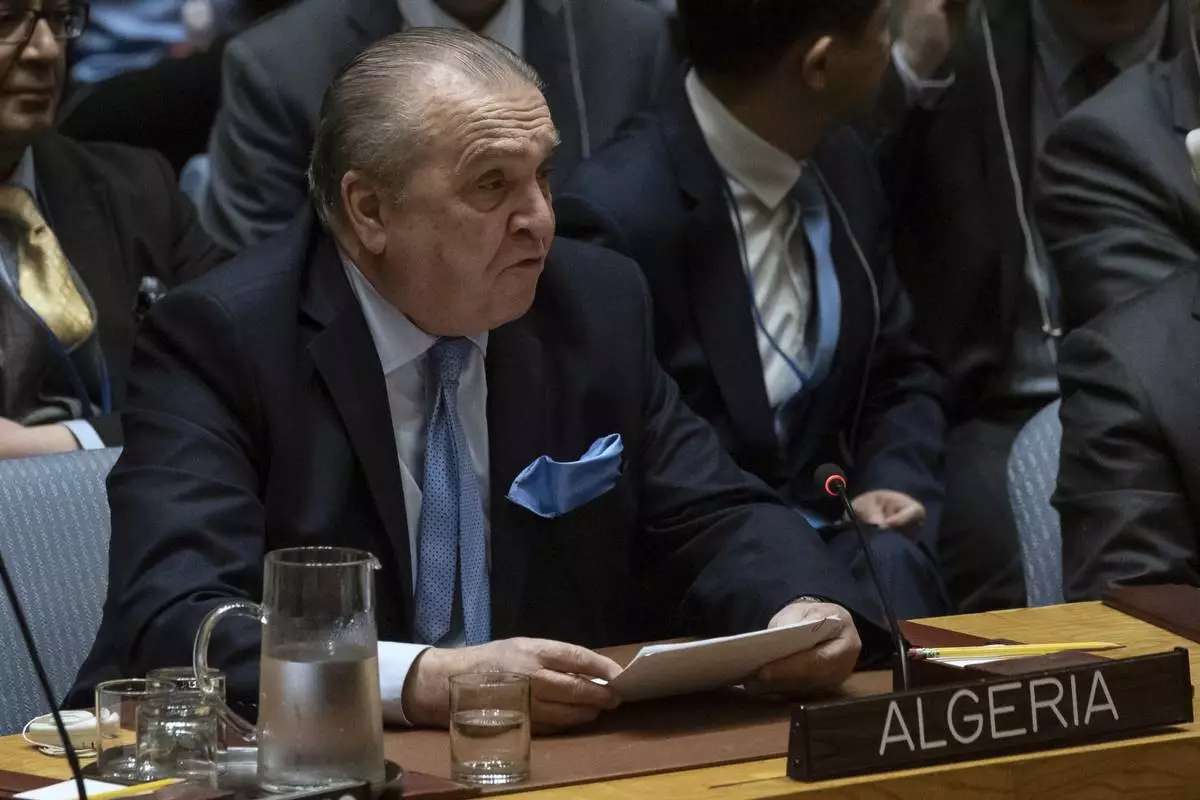
Algeria's Permanent Ambassador to the United Nations Amar Bendjama speaks during a Security Council meeting at United Nations headquarters, Thursday, April 18, 2024. (AP Photo/Yuki Iwamura)
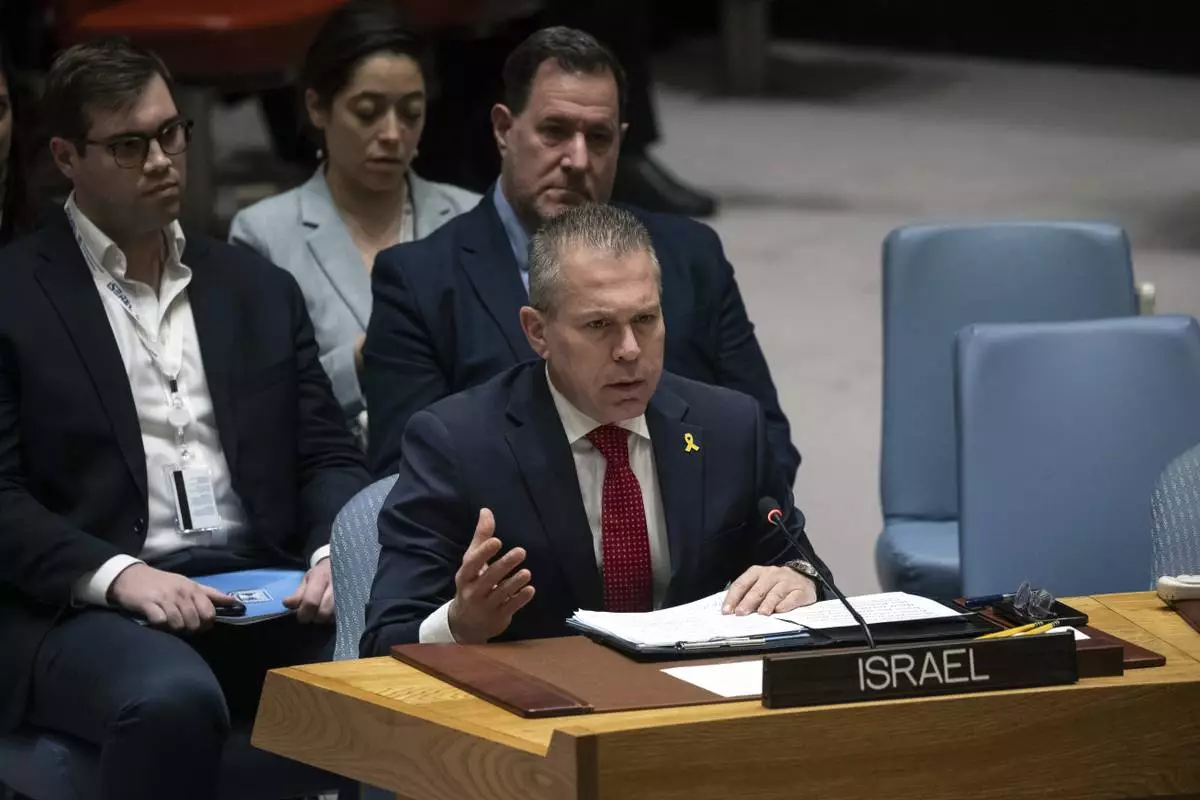
Israeli Ambassador to the United Nations Gilad Erdan speaks during a Security Council meeting at United Nations headquarters, Thursday, April 18, 2024. (AP Photo/Yuki Iwamura)
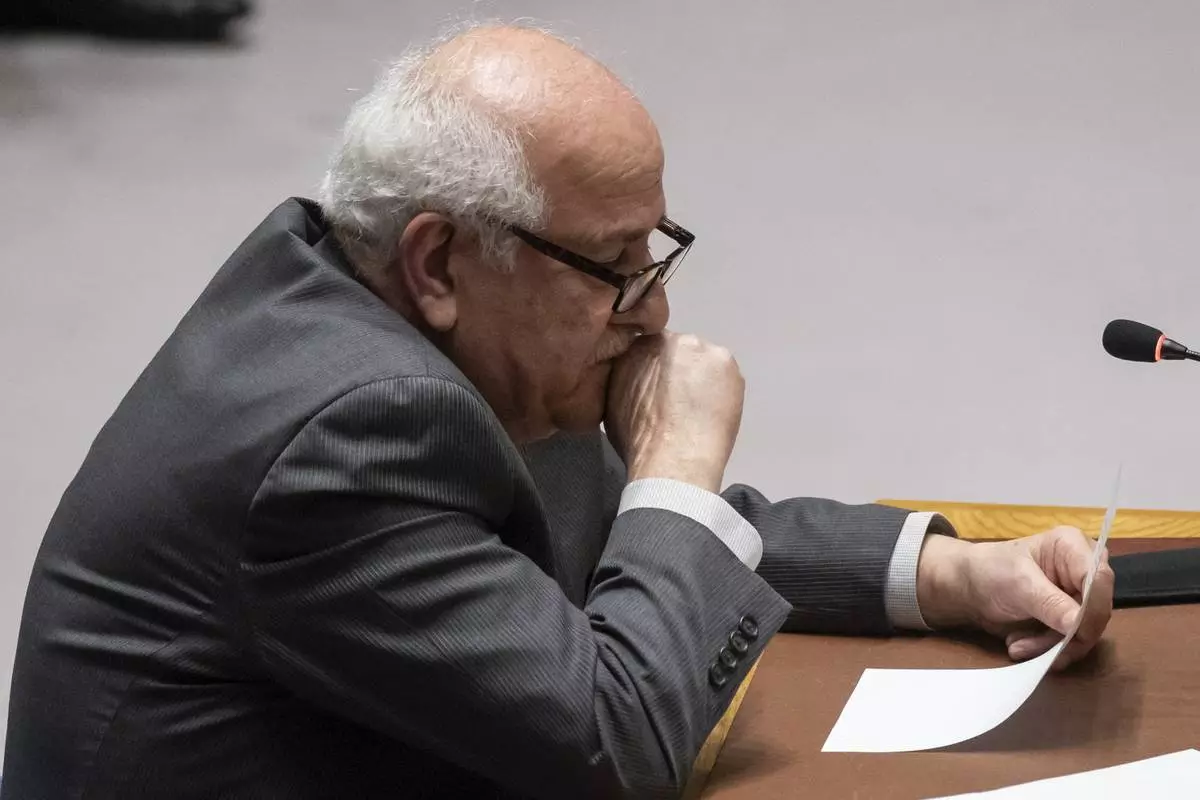
Palestinian Ambassador to the United Nations Riyad Mansour holds tears while speaking during a Security Council meeting at United Nations headquarters, Thursday, April 18, 2024. (AP Photo/Yuki Iwamura)
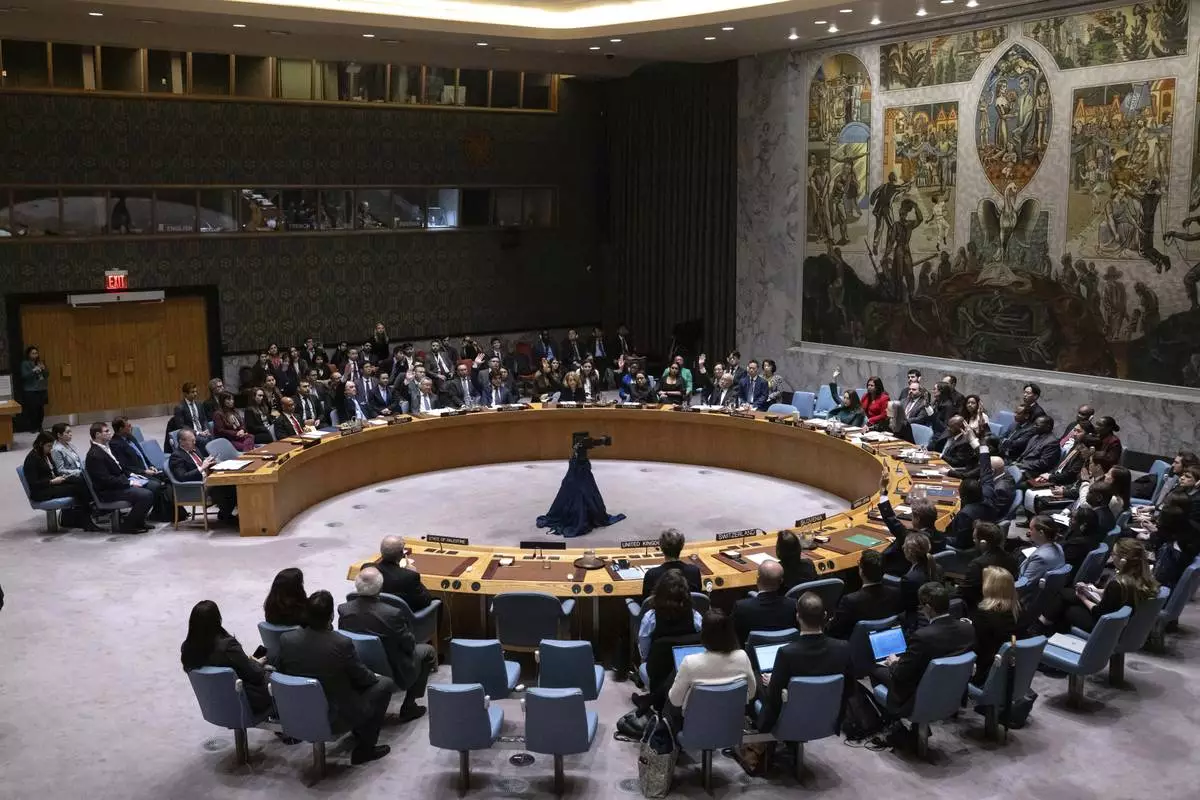
Representatives of member countries take votes during a Security Council meeting at United Nations headquarters, Thursday, April 18, 2024. (AP Photo/Yuki Iwamura)
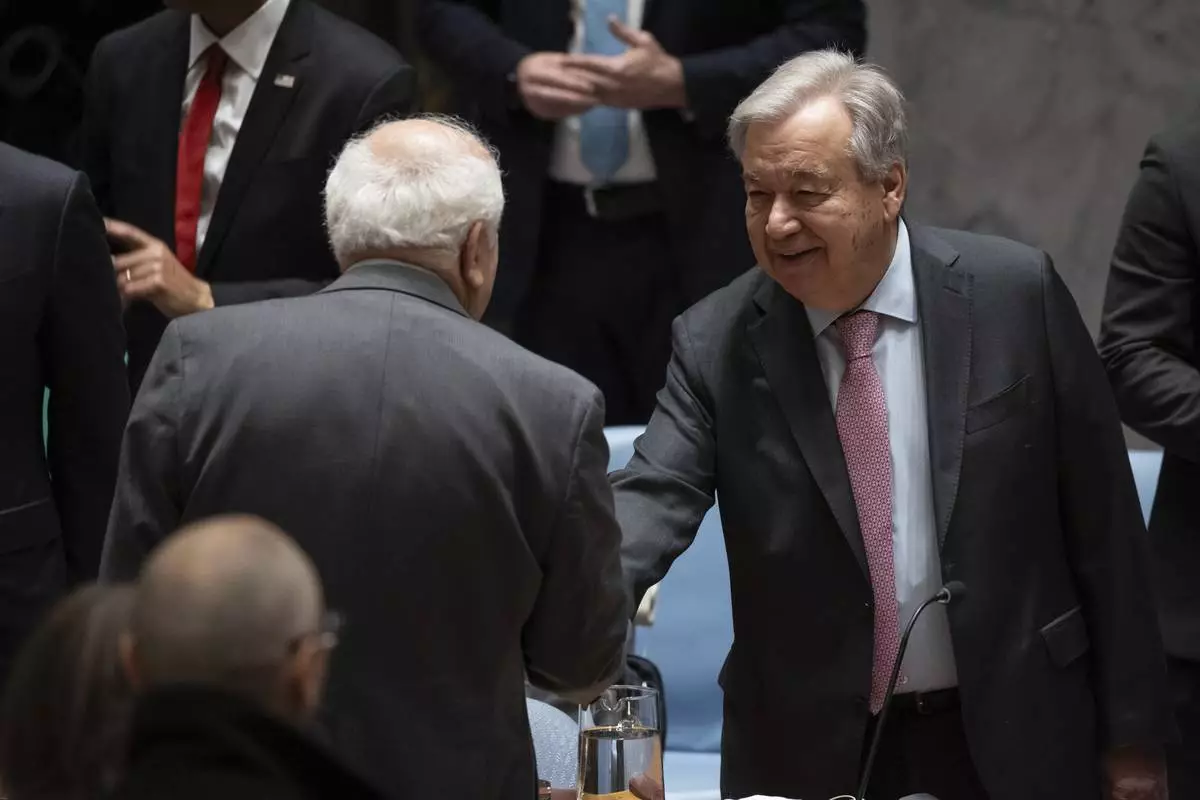
Palestinian Ambassador to the United Nations Riyad Mansour, left, and United Nations Secretary-General Antonio Guterres speak before a Security Council meeting at the United Nations headquarters, Thursday, April 18, 2024. (AP Photo/Yuki Iwamura)
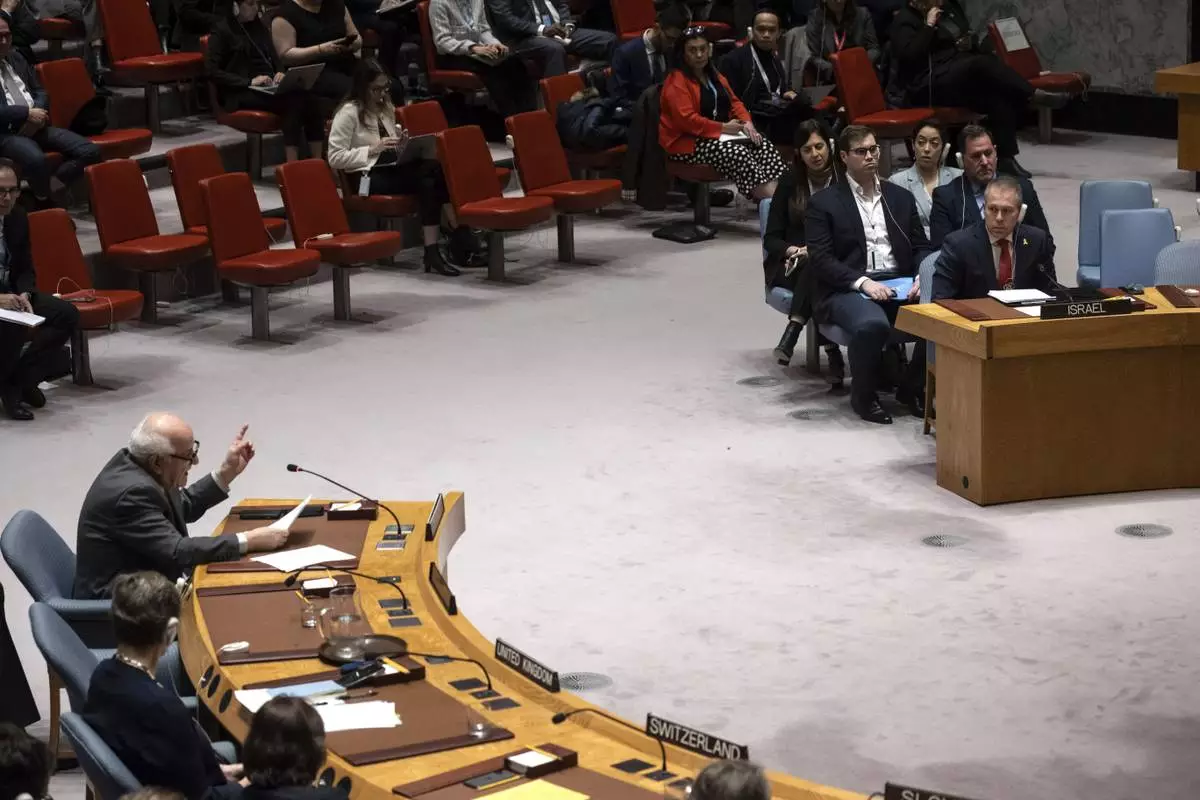
Palestinian Ambassador to the United Nations Riyad Mansour speaks during a Security Council meeting at United Nations headquarters, Thursday, April 18, 2024. (AP Photo/Yuki Iwamura)
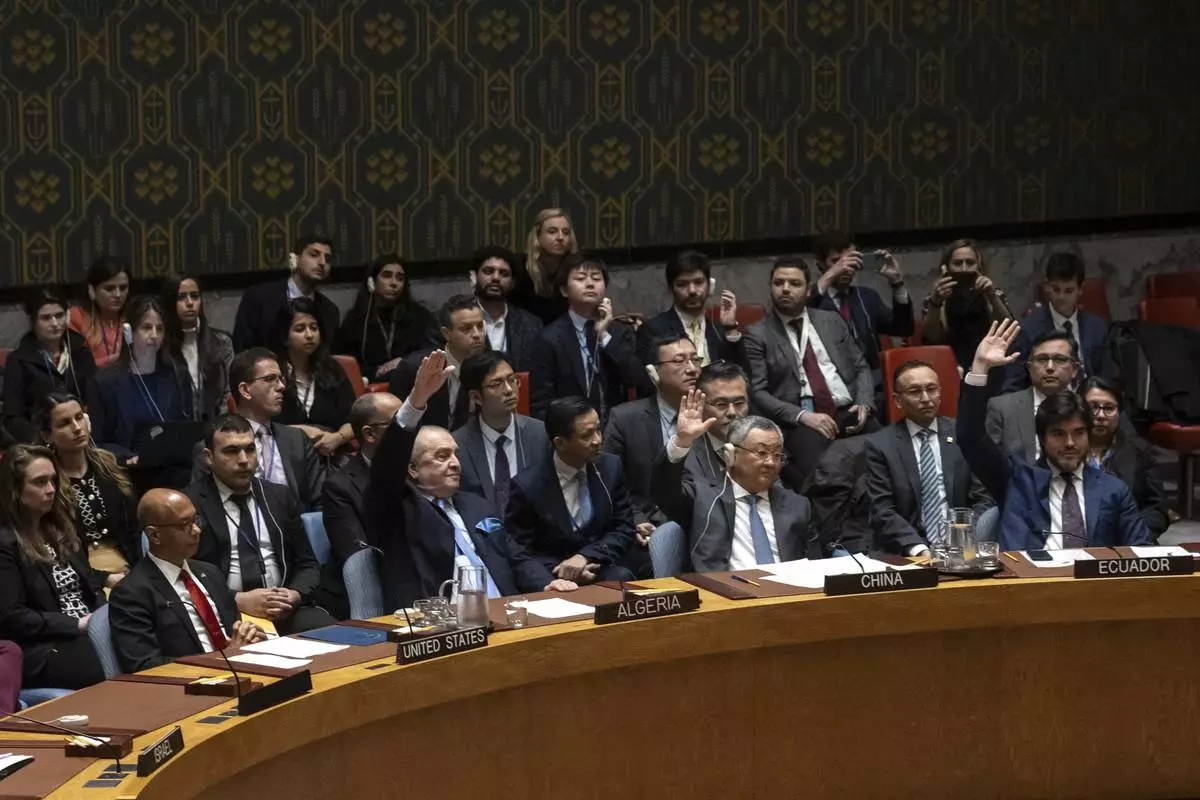
Representatives of member countries take votes during a Security Council meeting at United Nations headquarters, Thursday, April 18, 2024. (AP Photo/Yuki Iwamura)
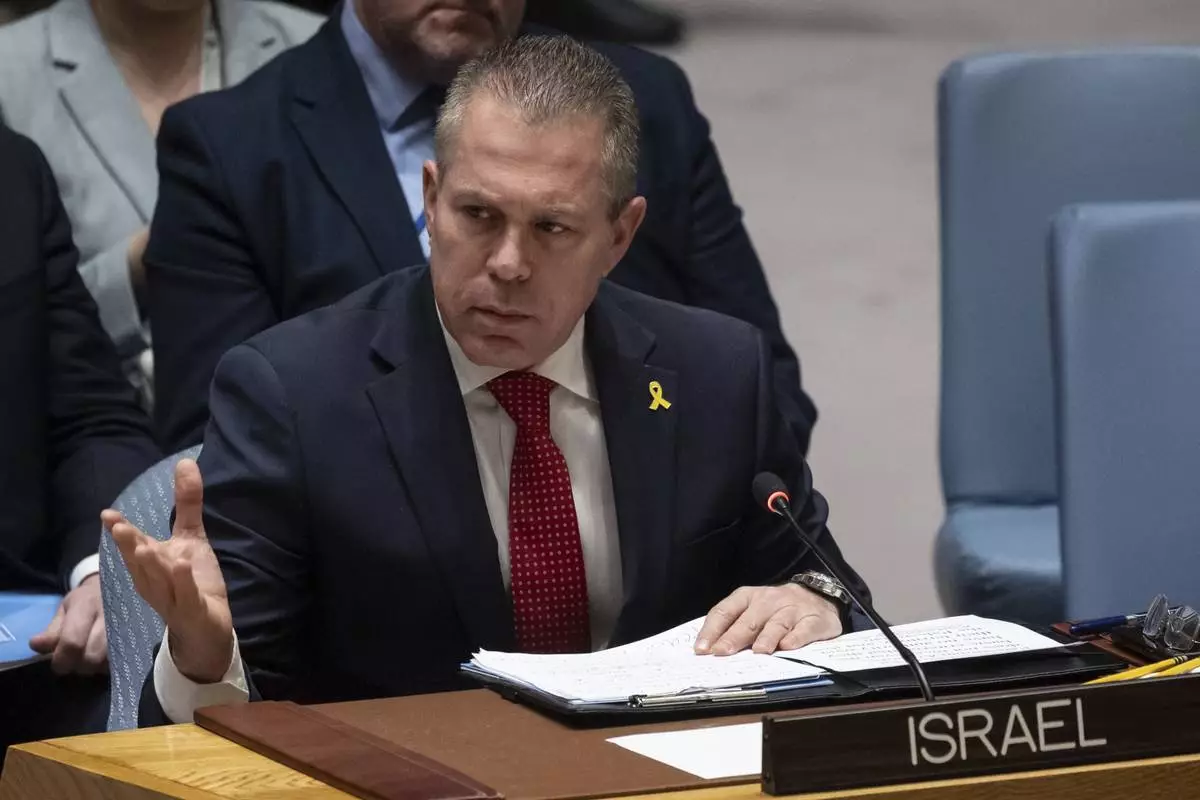
Israeli Ambassador to the United Nations Gilad Erdan speaks during a Security Council meeting at United Nations headquarters, Thursday, April 18, 2024. (AP Photo/Yuki Iwamura)
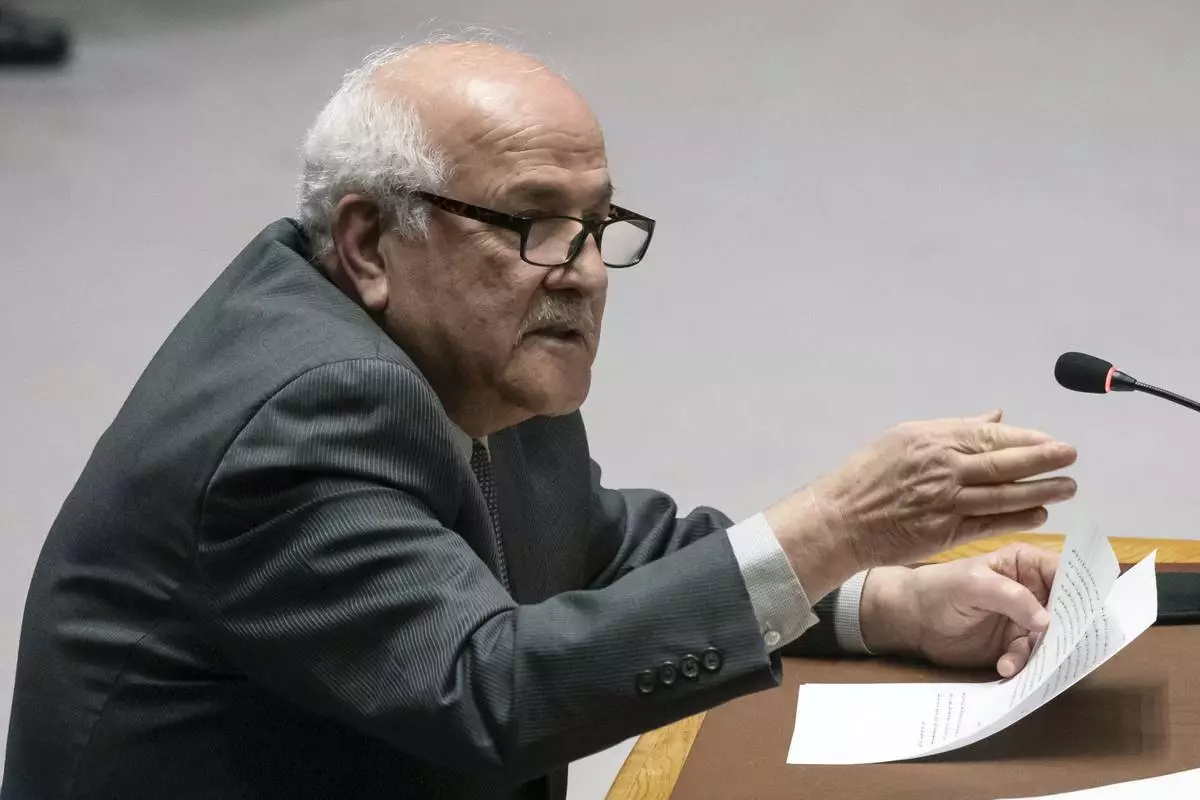
Palestinian Ambassador to the United Nations Riyad Mansour speaks during a Security Council meeting at United Nations headquarters, Thursday, April 18, 2024. (AP Photo/Yuki Iwamura)
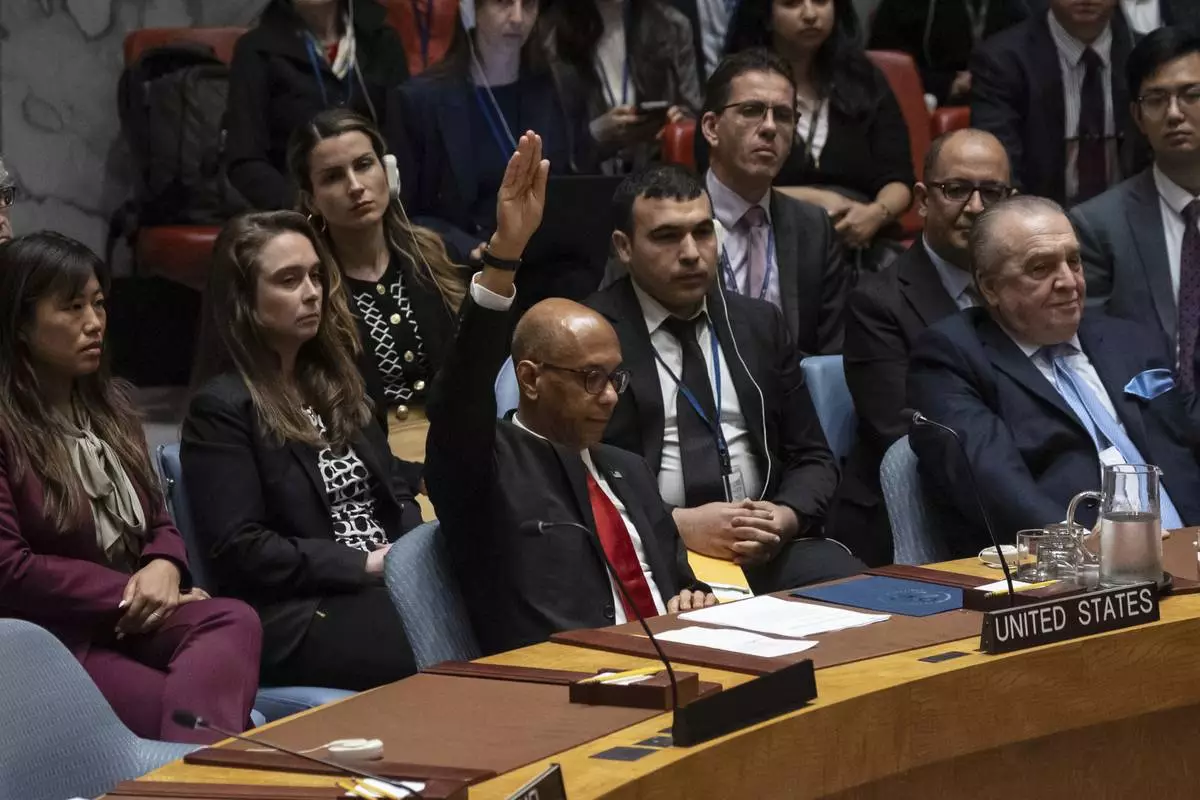
U.S. Deputy Ambassador Robert Wood votes against resolution during a Security Council meeting at United Nations headquarters, Thursday, April 18, 2024. (AP Photo/Yuki Iwamura)






















